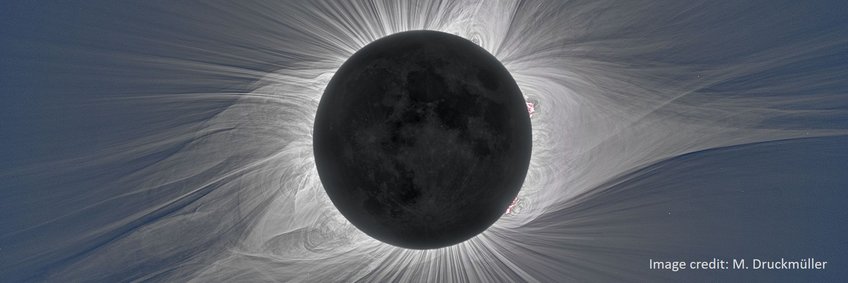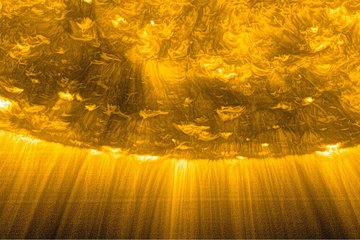
Solar and Stellar Coronae
A cool star like our Sun is surrounded by a hot outer atmosphere, the corona. The main science goal of our group is to understand the structure, dynamics, and heating of the outer atmospheres of the Sun and other stars. This involves not only the processes within the million Kelvin hot corona, but in particular also addresses the problems of how coronal structures are rooted magnetically in the lower atmosphere, i.e. the photosphere and chromosphere, and how the solar corona impacts the inner heliosphere, e.g. through the solar wind or coronal mass ejections. To address these science questions, we employ theory and numerical modelling, spectroscopic and imaging observations, and participate in instrumentation. Group members are making key contributions to the remote sensing instruments on ESA’s Solar Orbiter mission to be launched in 2019 that will provide unique data at high spatial resolution from unexplored viewpoints. For our observations, we analyse data from coronagraphs (mostly STEREO), from extreme UV spectrographs (mostly IRIS, SUMER and Hinode/EIS) and extreme UV imagers (mostly AIA/SDO). In combination with high-resolution magnetic field observations in the photosphere, e.g. from Sunrise, this enables us to link the thermal structure of the upper atmosphere to the solar surface. To investigate the magnetic structure of the upper atmosphere we apply a range of techniques covering (force-free) extrapolations, magneto-frictional models and magneto-static models, as well as 3D magneto-hydrodynamics models to study the interaction of plasma and magnetic field. Understanding the corona of the Sun is a step to understand also other more active stars, and through scaling models and observations to higher levels of activity we address the nature of stellar coronae in general.
Congratulations to L. Pradeep Chitta for his ERC starting grant ORIGIN

Magnetic structure at the footpoints of coronal loops revealed.
The left panel shows the magnetic field as observed by IMaX/Sunrise at the footpoints of coronal loops seen by AIA/SDO in the right panel. In general, the loops are rooted on one side in a plage area dominated by one magnetic polarity (black). Checking in more detail, the footpoints of coronal loops (white circles) are found at places where also small parasitic opposite polarities (white) are present. This shows that small-scale magnetic reconnection plays a key role for the energization of coronal loops that is much more prominent than thought before.
Currently we are looking for several PhD students to work in in the following projects:
Our research can be grouped into three science topics (please follow the links for more information):












